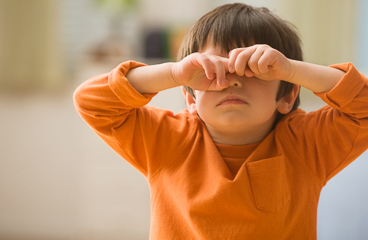Insomnia in Children: Care Instructions
Overview

Insomnia is the inability to sleep well. Insomnia may make it hard for your child to get to sleep, stay
asleep, or sleep as long as needed. This can make your child tired and grouchy during the day. It can also
make your child forgetful, less effective at school, and unhappy.
Insomnia can be linked to many things. These include health problems, medicines, and your child's thoughts
and behaviors that interfere with sleep.
Your doctor may work with you to find the cause of your child's insomnia. Your doctor can recommend steps you
can take that may help your child sleep better.
Follow-up care is a key part of your child's treatment and safety. Be sure to make and go to all
appointments, and call your doctor if your child is having problems. It's also a good idea to know your
child's test results and keep a list of the medicines your child takes.
How can you care for your child at home?
-
Your doctor can suggest things that you can try at home. They are based on your child's age and what might
be causing the insomnia.
-
If your child is older, your doctor may recommend cognitive behavioral therapy for insomnia. This can
include changing thoughts and behaviors that interfere with sleep.
-
If your doctor suggests it, try to have a bedtime routine to help your child get ready for bed and sleep.
-
Help your child get regular exercise.
-
If your doctor prescribes medicine, have your child take it exactly as prescribed. Call your doctor if
your child has any problems with a medicine.
Bedtime routine
-
Do not let your child have food or drinks with caffeine, such as soft drinks, iced tea, or chocolate, for
8 hours before bed.
-
Do not let your child eat a big meal close to bedtime. If your child is hungry, let them eat a light
snack.
-
Do not let your child drink a lot of water close to bedtime, because the need to urinate may wake up your
child during the night.
-
Do not let your child read, watch TV, or use electronic devices, such as smartphones and tablets, in bed.
Use the bed only for sleeping.
-
Make your house quiet and calm about an hour before your child's bedtime. Turn down the lights, turn off
the TV, log off the computer, and turn down the volume on music. This can help your child relax after a busy
day.
-
Have your child go to bed at the same time every night and wake up at the same time every morning.
-
Keep your child's bedroom quiet, dark, and cool. It may help to remove the TV, computer, and other
electronic devices from your child's room.
-
Have your child sleep on a comfortable pillow and mattress.
-
If watching the clock makes your child anxious, turn it so your child can't see the time.
-
If your child worries when going to bed, have your child start a worry book. Well before bedtime, have
your child write down their worries, and then set the book and concerns aside.
When should you call for help?
 Watch closely
for changes in your child's health, and be sure to contact your doctor if:
Watch closely
for changes in your child's health, and be sure to contact your doctor if:
Current as of: July 10, 2023
Content Version: 14.0
Care instructions adapted under license by your
healthcare professional. If you have questions about a medical condition or this instruction, always ask
your healthcare professional. Healthwise, Incorporated disclaims any warranty or liability for your use of
this information.